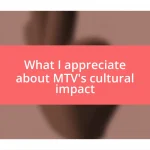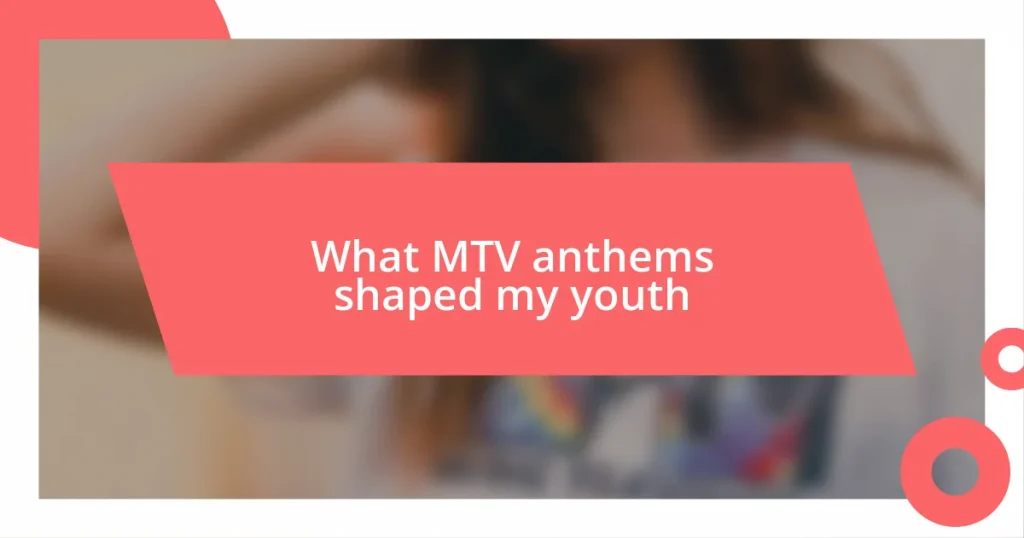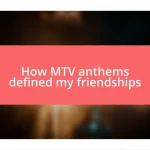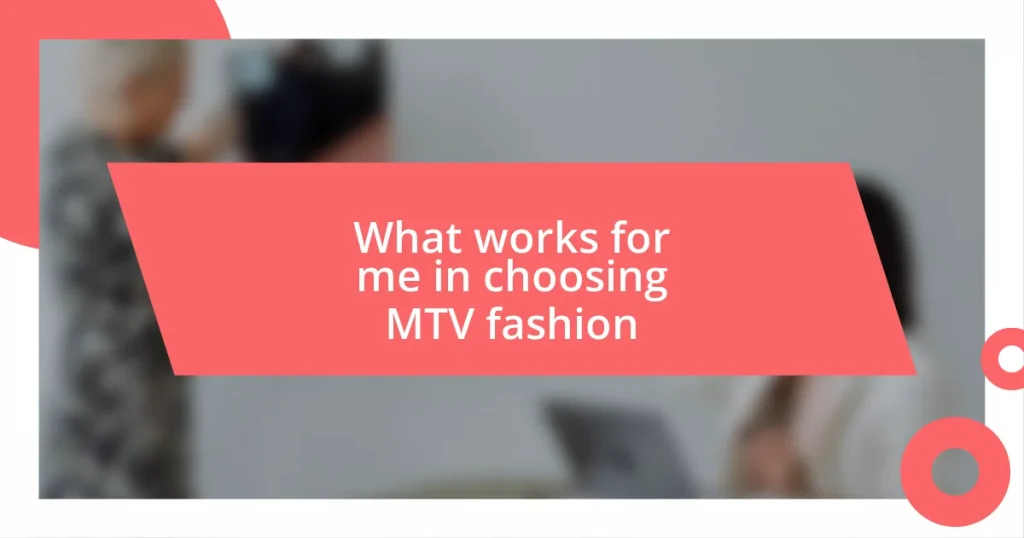Key takeaways:
- MTV anthems created a cultural phenomenon that shaped youth identity through shared experiences, music, and fashion.
- Influential artists like Madonna, Michael Jackson, and Nirvana offered powerful messages of individuality and rebellion that resonated deeply with young audiences.
- The legacy of MTV continues to influence contemporary music and culture, reflecting themes of self-expression and mental health that remain relevant today.
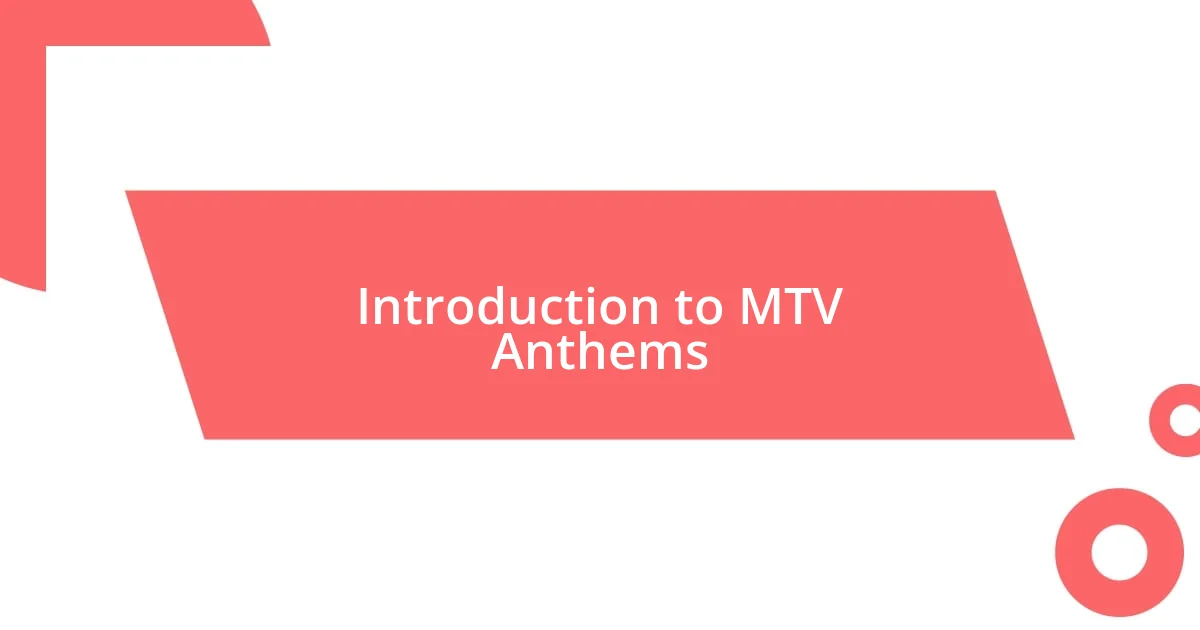
Introduction to MTV Anthems
MTV anthems played a pivotal role in shaping the musical landscape of my youth. I still recall the excitement of gathering with friends, our anticipation building as we waited for our favorite videos to air. Those moments, filled with laughter and sing-alongs, created not just memories but a soundtrack to our lives.
As a teenager, I often found solace in the lyrics and beats of these songs. They spoke to my experiences and emotions in ways that felt deeply personal. I remember blasting a certain anthem in my bedroom, the bass thumping as I danced away my worries; it was as if the song was a friend, understanding my every struggle.
Have you ever felt a song resonate with your very being? I often reminisce about how those MTV anthems served as both a refuge and a celebration. They captured the essence of my youth, reflecting the dreams, heartbreaks, and rebellious spirit of a generation eager to find its voice.

Defining MTV’s Cultural Impact
MTV’s cultural impact was monumental, serving as a catalyst for youth identity during its heyday. I fondly recall the way a single music video could spark a trend or ignite a cultural conversation. I remember watching “Thriller” and feeling an electric thrill as the visuals transformed music into a spectacle that transcended genres. It made me think about how music videos were not just about the song; they were an art form that shaped our perceptions, influencing fashion, dance, and even attitudes.
The influence of MTV reached far beyond mere entertainment. It created a shared space where diverse voices could emerge, challenging norms and encouraging self-expression. I still remember discussing the bold styles of artists like Madonna with my friends at school; it was as if every outfit and lyric became part of our own shared language. MTV didn’t just reflect culture; it shaped it, driving us to engage with social issues, explore new identities, and connect with others who felt equally inspired.
Looking back, the songs I heard on MTV encapsulated more than just catchy tunes. They voiced our collective aspirations, fears, and dreams. I cannot shake the memories of belting out those lyrics at gatherings, feeling a sense of unity among my peers. Listening to these anthems created bonds that have lasted a lifetime. Each beat felt like an affirmation, validating our experiences as young individuals carving out our identities in a world that often seemed confusing.
| Aspect | MTV’s Influence |
|---|---|
| Fashion Trends | Able to launch new styles and redefine norms through visual expression. |
| Cultural Conversations | Facilitated discussions on identity, politics, and social issues through music videos. |
| Shared Experiences | Created a community where young people connected through shared musical moments. |

Influential Artists from MTV Era
The MTV era introduced us to a cast of artists who truly defined the sound of a generation. I can still hear the echo of Madonna’s “Like a Virgin,” each note resonating with a sense of rebellion and self-discovery. It was empowering to see her boldness, which encouraged many of us to embrace our uniqueness and challenge societal norms.
As I look back, several artists emerge not just as icons but as influences that shaped our identities and values. Here are a few that stand out in my memory:
- Madonna: The Queen of Pop whose edgy style and lyrics pushed boundaries, inspiring confidence to be unapologetically oneself.
- Michael Jackson: His mesmerizing dance moves and storytelling in videos like “Thriller” created an indescribable excitement and energy that still leaves me in awe.
- Nirvana: With grunge taking center stage, Kurt Cobain’s raw emotion in songs like “Smells Like Teen Spirit” captured the angst of a youth yearning for authenticity.
- Prince: His fusion of genres and vibrant persona sparked conversations about sexuality and individuality, making it feel okay to embrace one’s true self.
- Whitney Houston: Her powerful voice in anthems like “I Will Always Love You” resonated with emotions that felt incredibly personal, bringing tears of joy and heartache alike.
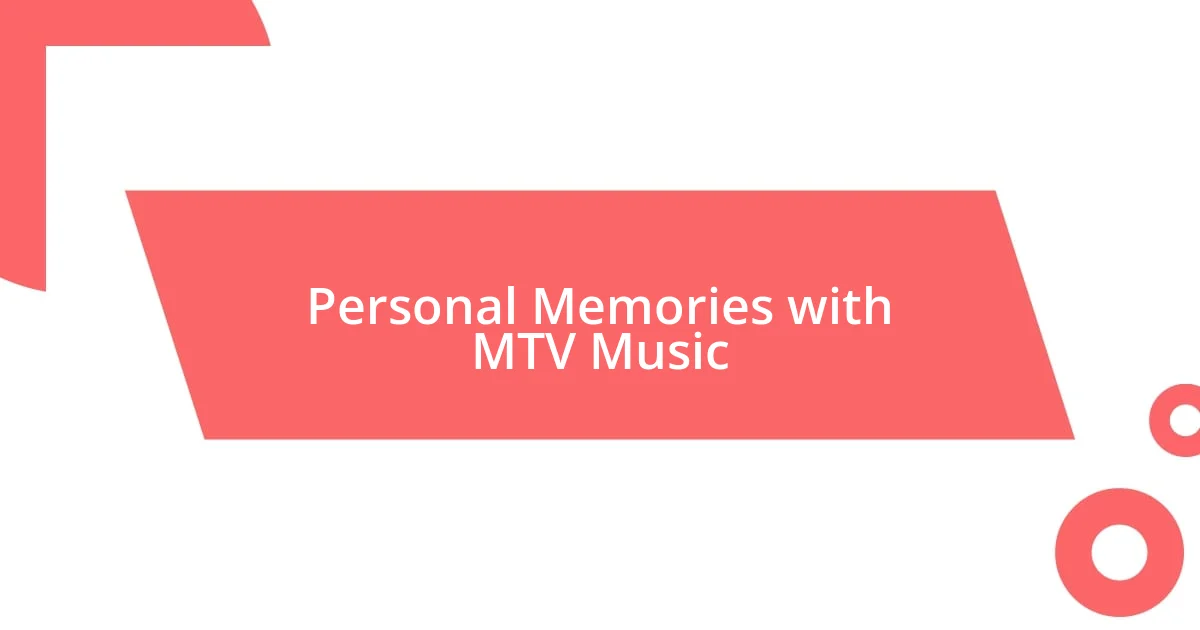
Personal Memories with MTV Music
As I think back to those iconic MTV moments, one memory stands out vividly. I was at a friend’s house for a sleepover when we all crowded around the TV, eyes glued to the screen as “Vogue” premiered. Hearing the music and watching the striking visuals made us feel like we were part of something incredibly important. We started lip-syncing and striking poses, dreaming of the confidence Madonna exuded. Doesn’t everyone have that one music video that makes them feel alive?
Another vivid recollection is my first experience with Nirvana’s “Teen Spirit.” I remember the overwhelming feeling of rebellion washing over me as I stood with my friends in a chaotic living room during a high school party. The raw energy from that song wrapped around us like a warm blanket, igniting a camaraderie that only music can create. It made me wonder, how could a simple song resonate so deeply with our struggles and aspirations?
Years later, I still hear Whitney Houston’s “I Will Always Love You” echoing through my mind. I’d sing that anthem in the shower, not just for the thrill of it, but because it spoke to heartbreak and hope in a way that felt incredibly personal, as if she understood my innermost feelings. Those emotional connections to these songs transformed my teenage years into a vibrant tapestry of experiences that I carry with me to this day. Can you remember a song that made you feel understood when the world felt a bit too heavy?

How MTV Shaped Youth Identity
MTV wasn’t just a channel; it was a cultural phenomenon that sculpted our identities in ways that still shape us today. I remember sitting in front of the television, mesmerized by the videos I saw, each one a window into a world of self-expression. Artists like Madonna and Nirvana didn’t just provide a soundtrack; they initiated conversations about who we were and who we wanted to be. I often wondered, did they realize the impact they were having on us?
At school, conversations revolved around the latest music videos, with friends dissecting lyrics and performances almost like they were sacred texts. I recall the first time I wore a “Smells Like Teen Spirit” t-shirt; it felt like I was wearing my identity on my sleeve. It was empowering to connect with others who felt the same rush of rebellion and authenticity that grunge represented—our shared experiences became a kind of unspoken bond that defined friendships during those formative years.
Looking back, the fashion trends introduced through MTV also played a significant role in shaping our self-perception. Remember those oversized flannel shirts and combat boots? They weren’t just clothing; they were statements that screamed individuality and freedom. I often found myself expressing my emotions through my wardrobe, adopting styles that echoed the fierce independence of my favorite artists. How many of us forged our identities through the music and fashion of that era, crafting a unique style that was undeniably ours?
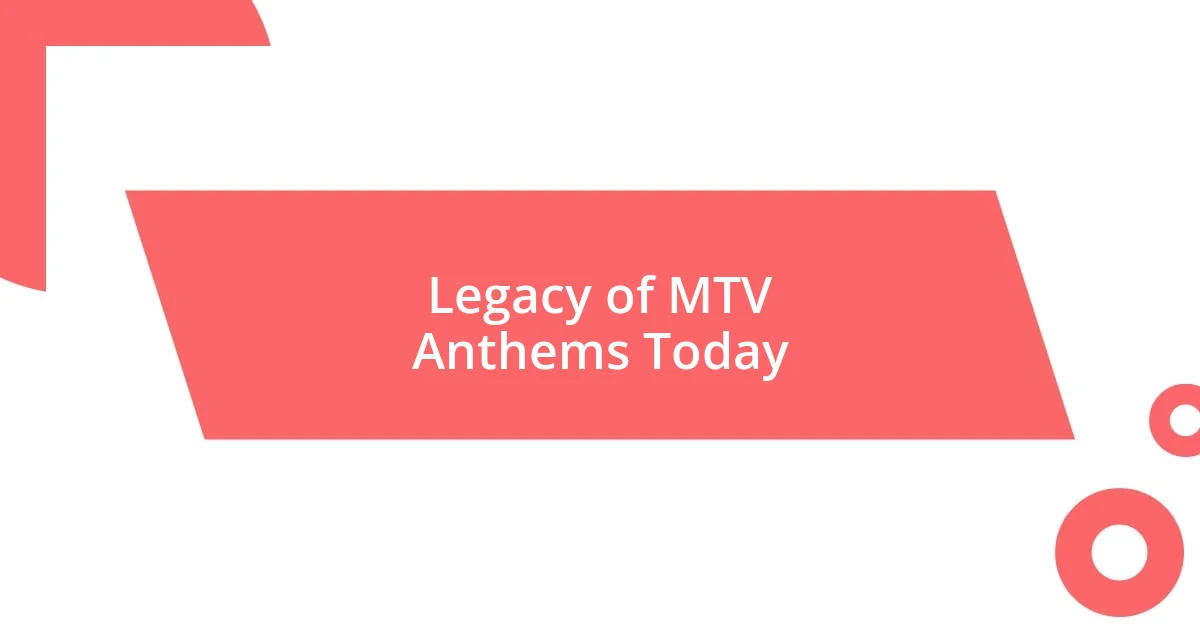
Legacy of MTV Anthems Today
Considering the lasting impact of MTV anthems, it’s fascinating to see how they continue to influence contemporary music and culture. The catchiest hooks and iconic beats of the ’80s and ’90s still resonate with today’s artists. I often find myself surprised when I hear a new pop song that samples a familiar tune or references an iconic music video. Does it ever make you wonder how much of our current musical landscape is built on the foundation laid by those MTV anthems?
Reflecting on my own experiences, I’ve noticed that the themes of self-expression and rebellion depicted in those music videos remain relevant. For instance, watching Billie Eilish rise to fame feels like a nod to the gritty authenticity that groups like Nirvana championed in the past. I can’t help but think about how her music feels like an evolution of that same rawness, driving conversations about mental health and individuality that echo the sentiments we faced as teens. Isn’t it interesting how a new generation can take inspiration from what we once held dear?
Furthermore, the visuals introduced by MTV still shape our expectations of music today. When I see the elaborate music videos that accompany today’s hits, I can’t help but reflect on the artistry of those early clips. They sparked a trend that blurred the lines between music and visual art, encouraging artists to create experiences rather than just songs. Have you ever caught yourself getting lost in a music video, feeling that same rush of excitement we once felt as teens? That thrill of connection to the music is a legacy that, in many ways, remains alive and well.



